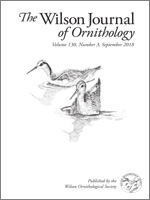Fragmentation and degraded habitat conditions can result in increased competition for critical resources, altered mating systems, and can eventually result in population declines or extinction. We investigated the degree to which habitat degradation and habitat loss impacted the breeding ecology of Greater Prairie-Chickens at 3 study sites across relatively intact grasslands in Kansas, USA. Across all 3 study systems, we found similar rates of multiple mating by females at 14–20% of broods. In addition, we found evidence for facultative nest parasitism of conspecific females. Prairie-chicken females inhabiting more intact and less fragmented landscapes with a higher probability of survival did not engage in parasitic egg laying, whereas ∼17% of females inhabiting a more fragmented and isolated landscape engaged in parasitic egg laying. Parasitic egg layers tended to be older females that parasitized nests of yearling females. Parasitic egg layers only laid parasitically after an initial nesting attempt failed. Parasitic laying females all renested and hatched their own clutches. When counting parasitically laid eggs, parasitic egg-laying females laid significantly more eggs than nonparasitic egg layers and, as a result, had 25% greater fecundity. This case study across the relatively intact grasslands of Kansas highlights how land use and management can influence adaptive life history traits and population stability. Consequently, understanding these relationships will be essential to developing effective future conservation and management plans for prairie-grouse.
How to translate text using browser tools
1 September 2018
A landscape perspective on rates of multiple paternity and brood parasitism among Greater Prairie-Chickens across Kansas, USA
Andrew J. Gregory,
Samantha M. Wisely,
Lance B. McNew,
Brett K. Sandercock
ACCESS THE FULL ARTICLE
anthropogenic impacts
evolution
grouse reproductive behavior
mate choice.





